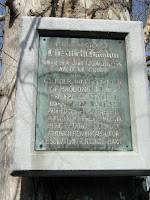 Tis the season for "ghoulies and ghosties and long-legged beasties and things that go bump in the night." For me, All Hallows' Eve evokes the nostalgia of youth. My hometown, Haddonfield, NJ, was perfect for Halloween. A small Quaker village located seven miles across the Delaware River from Philadelphia and first settled in the late 17th century.
Tis the season for "ghoulies and ghosties and long-legged beasties and things that go bump in the night." For me, All Hallows' Eve evokes the nostalgia of youth. My hometown, Haddonfield, NJ, was perfect for Halloween. A small Quaker village located seven miles across the Delaware River from Philadelphia and first settled in the late 17th century. Its name derives from the fact that most of the town's land made up the fields of Elizabeth Haddon. Daughter of a wealthy Quaker, she came to the colonies at the turn of the 18th century to manage her father's holdings. There she fell in love with and married an impoverished Quaker minister. Their love story is the theme of "The Theologian's Tale: Elizabeth" from Longfellow's Tales of the Wayside Inn.
During the Revolution, England's mercenary Hessians retreated to Haddonfield after the Battle of Red Bank. Many were laid to rest in the town graveyard. Elizabeth Haddon is buried there too, close to the marker pictured above. Many a dark night, I sat in that graveyard delighting in the disquieting darkness and macabre melancholy.
Stories abound of a headless Hessian who was buried there. Each Halloween night, he wanders the dark recesses of town searching for his head. In my youth, a rite of passage was to walk alone in that graveyard late on Halloween night only to be scared witless by the older kids. The next year you helped frighten the next group of neophytes.
Many years later, I was dating a woman who loved Halloween. One October 31, just before midnight, I took her to the graveyard to relive the past. In the interim, halogen lights were installed on the Quaker meeting house and the fire station that border the graveyard. They were to ward off young ne're-do-wells which apparently I was back then. Rather than savor the eerie darkness and whispering trees, the illumination allowed us to read inscriptions on the gravestones. Thomas Wolfe was right; you can't go home again. As ever - BB
"Deep into that darkness peering, long I stood there, wondering, fearing, doubting, dreaming dreams no mortal ever dared to dream before." - Edgar Allan Poe


